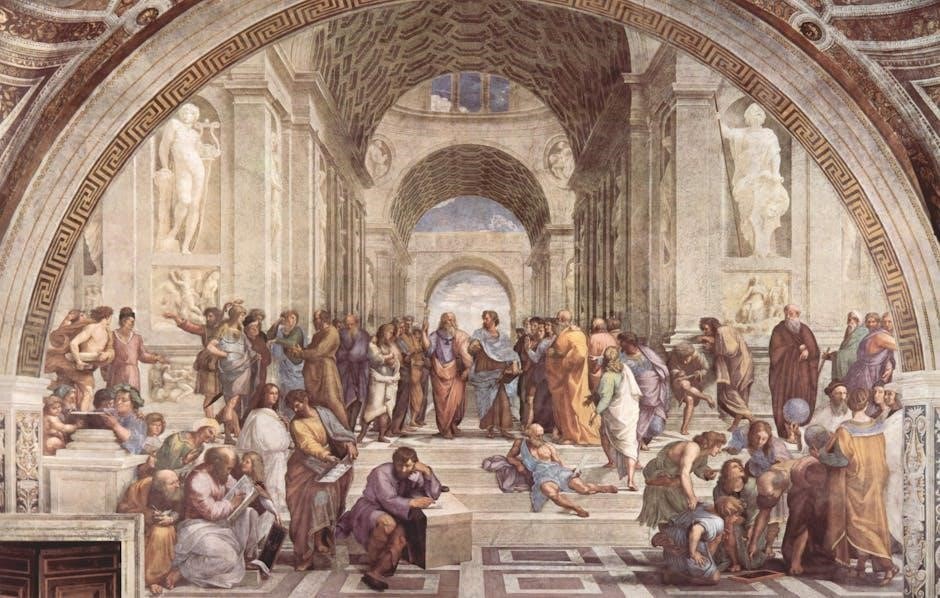Plato’s Gorgias explores the tension between rhetoric and philosophy, examining their ethical implications. Through Socrates’ dialogue with Gorgias, Polus, and Callicles, Plato critiques the misuse of rhetoric and power, advocating for justice and truth. This dialogue remains central to understanding Plato’s philosophical stance on ethics, education, and the ideal society.
Overview of the Dialogue
Plato’s Gorgias is a Socratic dialogue that examines the nature of rhetoric, justice, and power. It begins with Socrates questioning Gorgias about the purpose of rhetoric, leading to debates with Polus and Callicles. Socrates argues that rhetoric, when divorced from truth and ethics, becomes a tool of manipulation. The dialogue critiques the sophist tradition, highlighting the tension between persuasive speech and philosophical wisdom. Through these exchanges, Plato explores the ethical implications of rhetoric and its impact on society, ultimately advocating for a philosophy grounded in justice and the pursuit of truth.
Historical Context and Significance
Plato’s Gorgias was written around 380 BCE, a time of intellectual and political ferment in Athens. It critiques the sophist movement, particularly Gorgias, who represented the art of persuasive speech. The dialogue reflects the tensions between philosophy and rhetoric, highlighting ethical concerns about the misuse of power and persuasion. As a foundational text in Western philosophy, it has shaped debates on justice, truth, and education. Its historical significance lies in its challenge to the sophists’ influence and its enduring relevance in exploring the ethical dimensions of communication. Today, it remains a key work in philosophical studies, widely available in PDF formats for scholarly and general readers alike.

Key Themes in Plato’s Gorgias
Plato’s Gorgias delves into rhetoric vs. philosophy, ethics, and justice, while critiquing power’s misuse. It highlights the clash between persuasive speech and moral truth, advocating for a just society.
Rhetoric vs. Philosophy
In Gorgias, Plato portrays rhetoric as a mere persuasive tool, often divorced from truth, while philosophy seeks wisdom. Socrates challenges Gorgias, arguing that rhetoric flatters rather than educates, prioritizing emotion over reason. This critique underscores Plato’s belief in philosophy as the true path to knowledge and justice, contrasting with rhetoric’s focus on power and manipulation. The dialogue highlights the ethical implications of rhetoric’s dominance, advocating for a society guided by philosophical inquiry rather than superficial persuasion.
Ethics and Justice
Plato’s Gorgias delves into the moral foundations of ethics and justice, contrasting rhetoric’s focus on persuasion with philosophy’s pursuit of truth. Socrates argues that true justice involves acting virtuously, while rhetoric often masks injustice. He challenges Polus and Callicles, asserting that harming others is inherently wrong, even if it achieves power. The dialogue emphasizes that justice is not about might but moral right, rejecting the notion that the end justifies the means. Plato underscores the ethical responsibility of individuals to seek truth and act justly, aligning with his vision of a morally grounded society.
The Role of Power and Persuasion
In Plato’s Gorgias, power and persuasion are critiqued as tools often misused to manipulate rather than enlighten. Socrates challenges the sophists’ belief that rhetoric’s goal is to persuade, arguing that true leadership should aim at justice and the common good. He distinguishes between persuasion that serves moral ends and persuasion that exploits emotions for personal gain. The dialogue highlights the ethical dangers of unchecked power and the importance of aligning persuasion with truth and virtue. This critique remains relevant, urging leaders to prioritize ethical principles over self-interest.

Structure of the Dialogue
Plato’s Gorgias is structured as a series of debates between Socrates and Gorgias, Polus, and Callicles, exploring rhetoric, justice, and power through their dramatic interactions.
Persons in the Dialogue
The dialogue features several key figures: Socrates, the philosopher who questions others; Gorgias, the renowned rhetorician; Polus, Gorgias’ assistant; and Callicles, a young, ambitious Athenian. Chaerephon, Socrates’ loyal follower, also appears briefly. Each character represents distinct perspectives, with Socrates challenging Gorgias’ views on rhetoric, Polus defending his mentor, and Callicles advocating for unchecked power. Their interactions drive the philosophical debate, exploring ethics, justice, and the role of rhetoric in society. These characters embody the tensions between philosophy and rhetoric, making the dialogue rich in ideological conflict and intellectual depth.
Dramatic Setting and Tone
The dialogue is set in Athens, during a gathering at Callicles’ home, where Gorgias is visiting. The tone shifts from formal to confrontational as Socrates engages in intense debates. The atmosphere is intellectually charged, reflecting the gravity of the topics discussed. Socratic questioning creates a sense of tension, while the interlocutors’ reactions reveal their emotional and philosophical commitments. The setting and tone underscore the clash between rhetoric and philosophy, highlighting the stakes of the argument and the depth of Plato’s critique of rhetorical practices.

Central Arguments and Debates
In Plato’s Gorgias, Socrates critiques rhetoric as manipulative, while Gorgias defends it as a noble art. Polus debates justice and power, exploring truth and morality.
Socrates’ Critique of Rhetoric
Socrates argues that rhetoric is not an art but a form of flattery, aiming to please rather than seek truth. He condemns its manipulative nature, asserting that it prioritizes persuasion over justice. Socrates questions the ethical validity of rhetoric, claiming it often serves selfish interests rather than the greater good. Through his dialogue with Gorgias and Polus, he challenges the notion that rhetoric is a noble art, instead highlighting its potential to corrupt and mislead. Socrates’ critique underscores the tension between rhetoric and philosophy, advocating for a pursuit of truth and wisdom over mere persuasion and power.
Gorgias’ Defense of His Art
Gorgias defends rhetoric as a noble and powerful art, essential for civic life. He argues that it enables individuals to inspire, persuade, and unite people, emphasizing its ability to achieve great things. Gorgias distinguishes rhetoric from other arts, asserting its unique value in shaping public opinion and fostering harmony. While acknowledging its potential misuse, he maintains that rhetoric, when wielded justly, is a positive force. His defense highlights rhetoric’s role in democracy and human interaction, challenging Socrates’ critique by framing it as a vital tool for societal progress and individual influence.
Polus and the Concept of Justice
Polus, a student of Gorgias, argues that justice is about enforcing punishment on wrongdoers, reflecting a societal view of retribution. He believes the powerful, acting with impunity, embody justice. Socrates challenges this, asserting that true justice involves living virtuously and harming no one. Polus’s perspective highlights the tension between societal norms and philosophical ideals, sparking a deeper exploration of morality, power, and the nature of justice in Plato’s dialogue.
Philosophical Implications
Plato’s Gorgias underscores the conflict between rhetoric and philosophy, emphasizing reason over persuasion. It highlights the pursuit of truth, ethical governance, and the ideal society, shaping Western philosophical thought.
The Nature of Knowledge and Truth
In Gorgias, Plato distinguishes between knowledge and mere opinion. Socrates argues that true knowledge involves understanding the essence of justice and morality, not persuasive speech. He contends that rhetoric, as practiced by sophists, prioritizes appearances over reality, leading to moral decay. Plato emphasizes that truth is universal and unchanging, attainable through reason and philosophy. This dialogue critiques relativism, asserting that genuine knowledge must align with ethical principles and the common good, reflecting Plato’s belief in the hierarchy of knowledge and the importance of intellectual and moral integrity. This theme remains central to philosophical debates about truth and epistemology.
The Ideal Society and Education
Plato’s Gorgias envisions an ideal society governed by philosopher-kings who prioritize justice and virtue. Education, in this vision, should cultivate the soul, teaching individuals to seek truth and act morally. Plato critiques the sophists’ focus on rhetorical manipulation, advocating instead for an education that aligns with ethical principles. He argues that true education fosters wisdom, enabling citizens to contribute to the common good. This dialogue underscores the importance of ethical leadership and the role of education in shaping a just society, reflecting Plato’s broader philosophical ideals about human flourishing and the state’s purpose.

Availability of Plato’s Gorgias in PDF Format
- Plato’s Gorgias is widely available in PDF format on online libraries and academic platforms.
- Popular sources include Google Books, archive.org, and university repositories.
- Users can also purchase or download it from e-bookstores like Amazon or Google Play.
Online Resources and Libraries
Plato’s Gorgias in PDF format is accessible through various online platforms. Google Books and archive.org offer free downloads of classical texts. LitRes provides the dialogue in Russian. Additionally, university libraries and digital repositories like Project Gutenberg host free e-book versions. Users can search using specific queries like “Plato Gorgias PDF” to find downloadable files. Many academic platforms also offer PDF versions for educational purposes, ensuring wide accessibility to this foundational philosophical work.
Academic Platforms and Repositories
Academic platforms like JSTOR and Google Scholar provide access to Plato’s Gorgias in PDF format. These repositories often feature peer-reviewed articles and downloadable texts. Users can refine searches using advanced operators to locate specific editions. Additionally, institutional libraries and open-access databases offer free PDF versions for research purposes. By utilizing these platforms, scholars and students can easily access and study Plato’s dialogue, facilitating deeper engagement with its philosophical themes.
